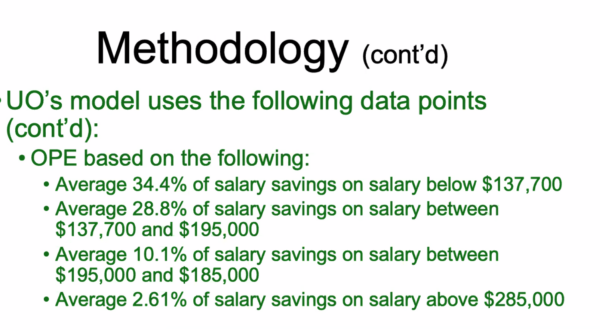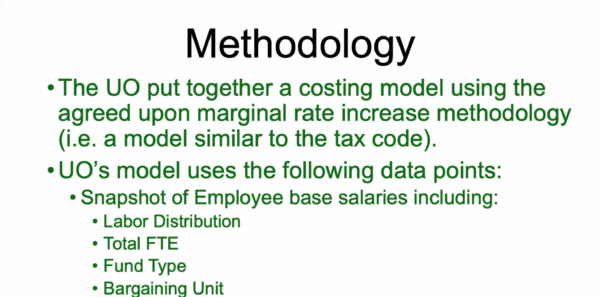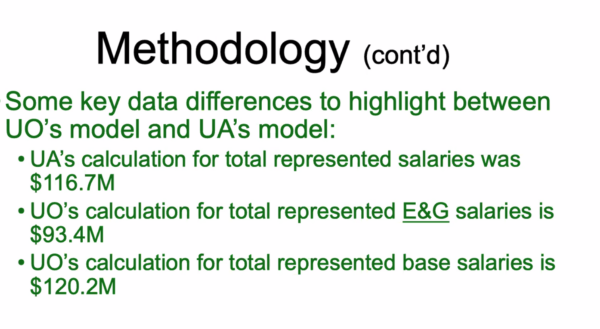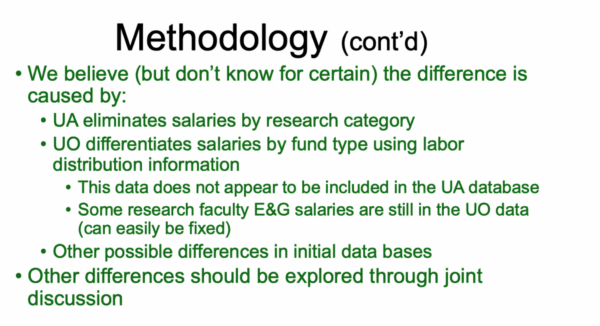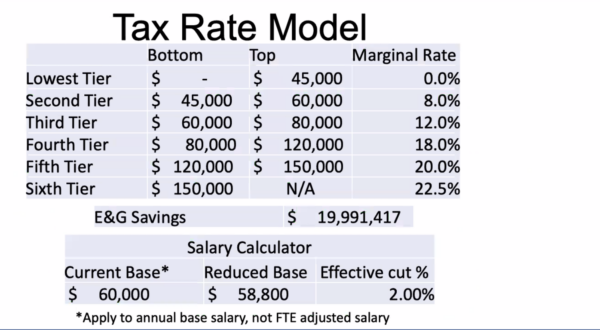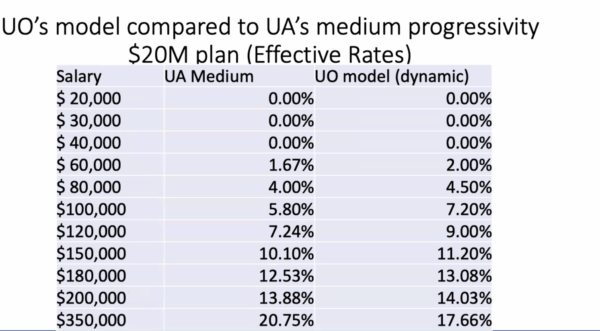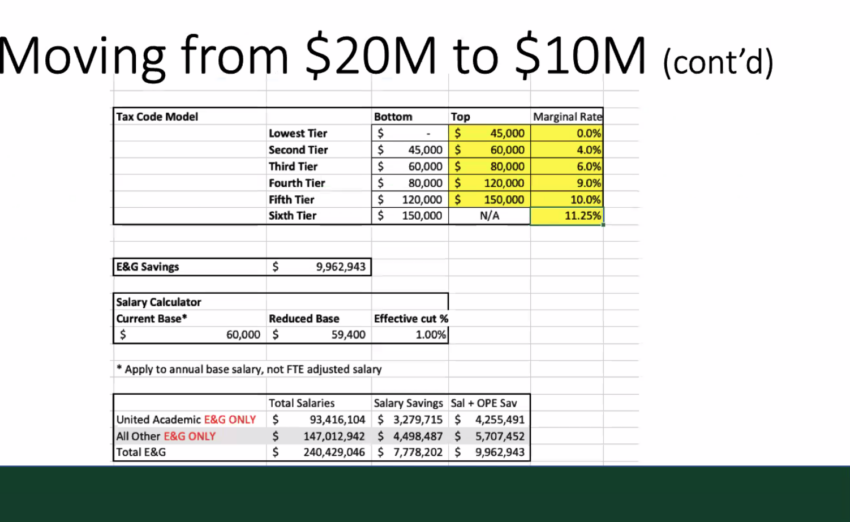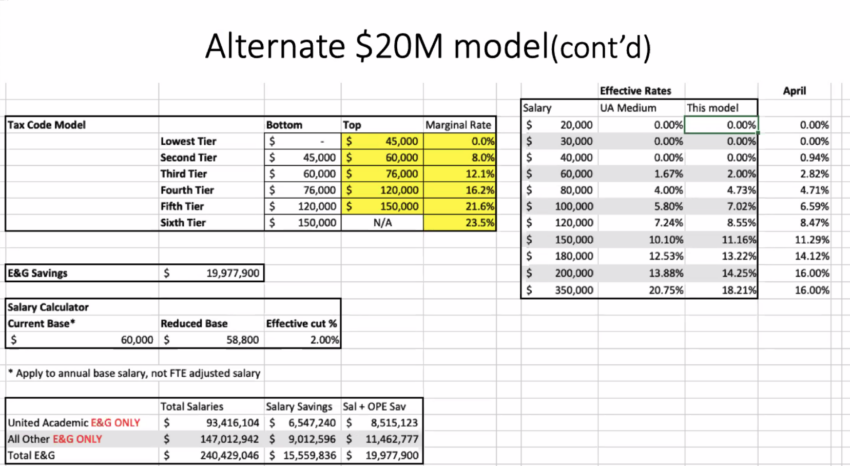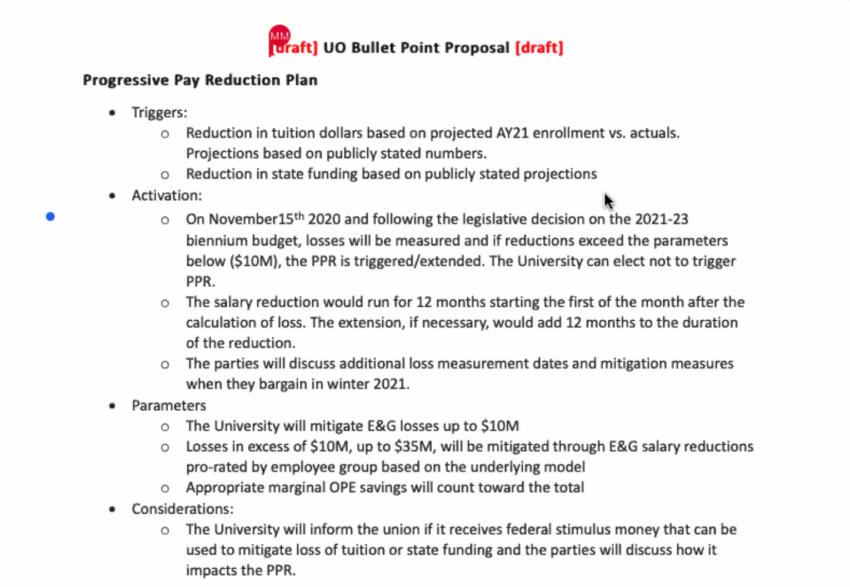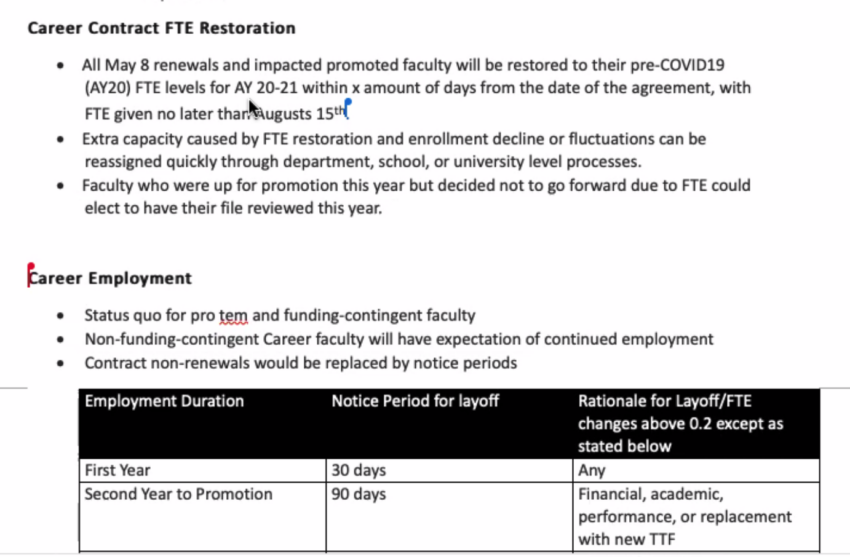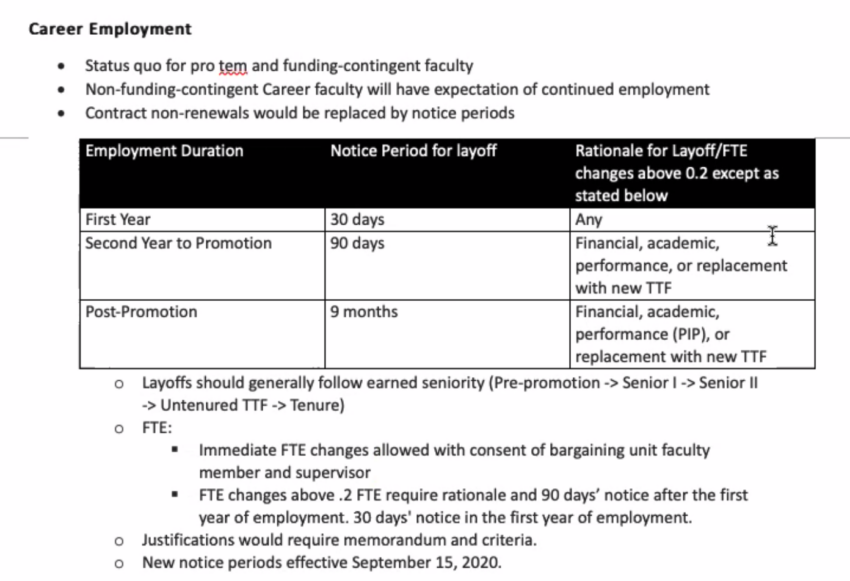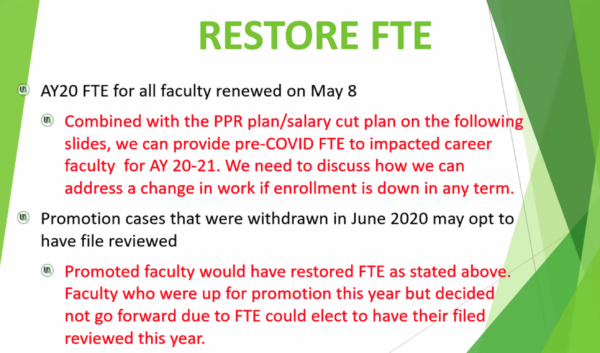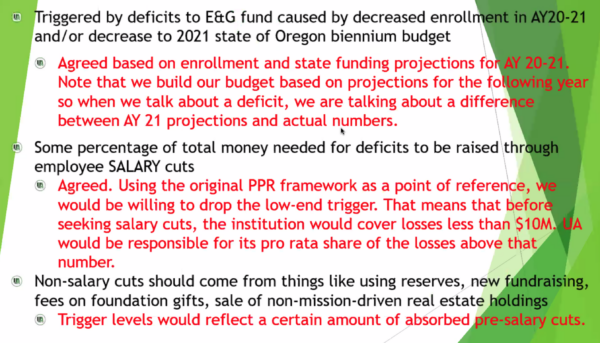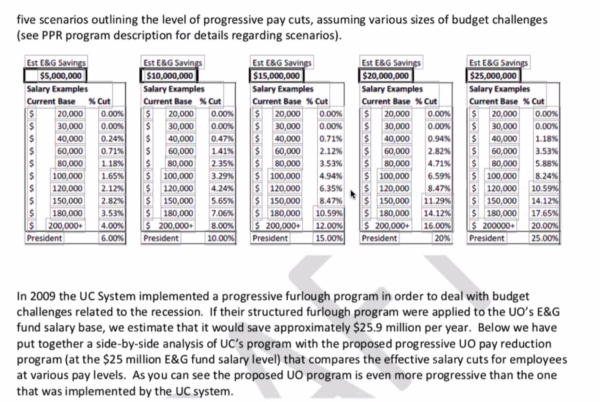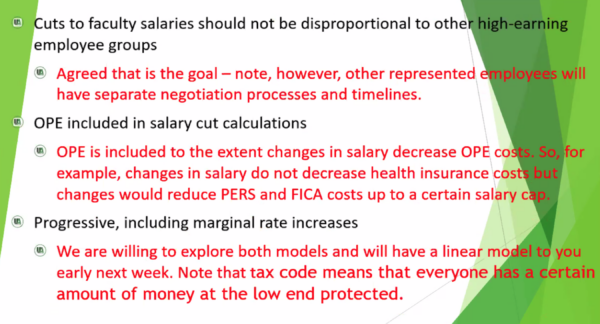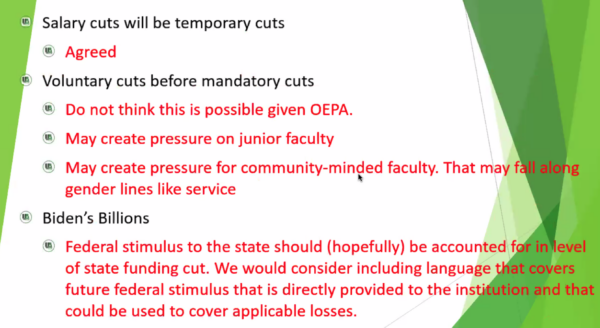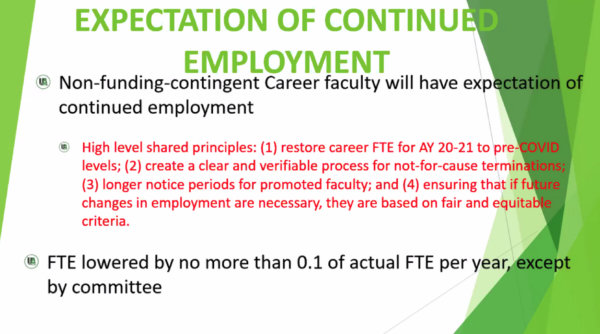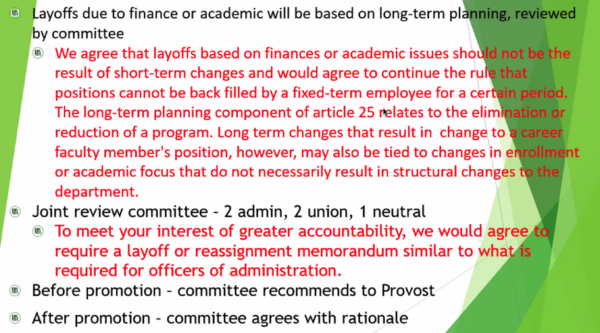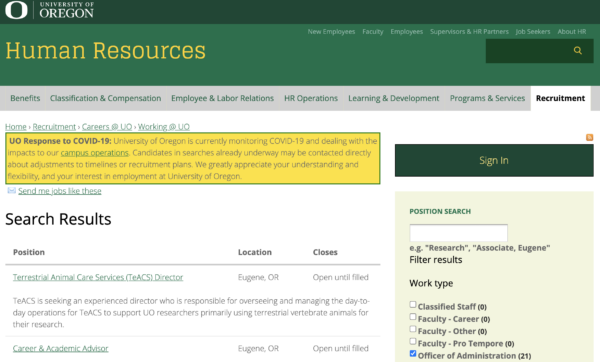8/10/2020: Dues paying members should have received this ballot in their email, around noon: Dear Colleagues, The United Academics Bargaining Team invites you to vote on an agreement that would restore Career faculty FTE, provide a system for a possible 12-month wage cut, and allow Career faculty who withdrew promotion files…
Posts tagged as “2020 faculty union bargaining”
Faculty Union to hold town hall to answer questions about pay cut deal
Dear Colleague, All members of United Academics are invited to a Town Hall on Tuesday, August 4 from noon to 1:30. The Zoom link is below. We are soliciting questions from members on a variety of issues we are facing as a community. Please submit your question(s) here. We will also take questions during…
Faculty Union’s deal is a big improvement over Pres Schill’s April ultimatum
It’s still a pay cut (assuming the revenue shortfall is large enough to trigger it) and it does nothing to constrain JH from pissing away money on the Phildo, Law School, etc. The cuts will apply to faculty and OAs – I’m not sure if that will include Knight Campus…
Bargaining IX, Tu at 9AM
July 28 @ 9 am. You can register for the sessions here. Usual disclaimer: my thoughts on what people are saying, trying to say, trying to be thinking, etc. Nothing is a quote unless in ” ” ‘s. Costs faculty and OA’s $19.5M Admin Caucus until 10:15. 11:10. The…
Bargaining VIII, this Wed at 3PM
7/22/2020: Liveblog, usual disclaimer: my thoughts on what people are saying, trying to say, trying to be thinking, etc. Nothing is a quote unless in ” ” ‘s.
Matella: We’re OK with the all in employees idea, and a 15-35 window. (That’s a very low threshold. UO has already cut costs more than this.)
Brad Shelton: I realize my initial model was too complicated for some people to understand, so I’ve made it more like the tax code. Also, I updated a lot of information which I haven’t shared with you before now.
(Typo in second to last bullet – $185K should be $285K)
Caucus break.
3:58 They’re back.
Caucus break.
4:53: Admins want another 10 min to caucus.
5:00: Admins want another 15 min to caucus.
5:15: Admins want another 5 min to caucus.
5:20: They’re back.
Took Brad awhile to turn his crank, but he’s got a new plan to protect the highest paid administrators:
Cecil: It would be helpful if you shared your data, as we shared the data we painfully scrapped from IR’s pdfs because UO won’t post machine readable files and Schill stopped reporting quarterly numbers.
Matella: OK, I think.
Cecil: What to do about TRP? High salary suggests high tax, low FTE suggests low tax. Keaton goes low, Brad goes high. Caucus til 5:45.
They’re back.
Cecil: We’re going to want to trim a little more off the top. We need Brad’s data.
Matella: We’ll get you his model. [Here’s hoping she means data, not model.]
Cecil: We’ve got the outlines of a deal, just need to hammer out parameters of the cuts. Can’t do that until you share Brad’s data.
Cecil: Hope we can get this done this week.
Bargaining VII, Tuesday 9AM until ?
The concept is simple: All faculty agree to take a progressive pay cut if the UO budget tanks, and in exchange the administration agrees to maintain career faculty employment. The details are going to take a while to work out. My impression is that both sides would like to get…
Bargaining VI – 9AM 7/16/2020
You can register to watch here, and will then receive a Zoom link via email. Liveblog, usual disclaimer: my thoughts on what people are saying, trying to say, trying to be thinking, etc. Nothing is a quote unless in ” ” ‘s. 10:00: Sorry, I’m tuning in late, trying to catch up.…
Bargaining V – 9AM 7/14/2020
You can register to watch here, and will then receive a Zoom link via email. Liveblog, usual disclaimer: my thoughts on what people are saying, trying to say, trying to be thinking, etc. Nothing is a quote unless in ” ” ‘s. Matella starts with the pay cut proposal. The administration’s…
Faculty Union bargaining update – next session this Tu 9AM til ?
From https://mailchi.mp/uauoregon/summer-bargaining-so-far?e=b103ce406c, all posted below: United Academics and the administration reconvened last week to discuss potential salary cuts, the restoration of fall FTE for affected Career faculty, and a plan for expectation of continuing employment for all Career faculty. The bargaining conversations have begun with each side presenting and discussing…
Bargaining IV, 7/7/2020
Liveblog, usual disclaimer: my thoughts on what people are saying, trying to say, trying to be thinking, etc. Nothing is a quote unless in ” ” ‘s. None of the usual chit-chat. Cecil sent in some written questions, Matella waited until just now to give him the answers. She claims…
Bargaining III, 7/2/2020
Liveblog: Usual disclaimer: My opinion of what people said, meant to say, or should have said. Nothing is a quote unless in quotes. The link to register and watch is below.
Matella: Brad is working on budget projections now. He knows algebra! I’ll get you them soon.
Here’s what the faculty would get for accepting cuts:
Cecil: Need to pin down what you mean by pre-COVID levels. You mean the 0.1 contracts that were being give out then, e.g. to AEI? Also, people get lied to.
Matella: OK will take back to my team. I agree that heads and deans tell faculty things that are not true. This is why we need central control.
Matella: We want to keep flexibility to change FTE on the fly.
Cecil: We don’t want you to keep flexibility to change FTE on the fly. Reading this, you could have used the above to give *all* NTTF 0.1 contracts – and waited until September to do it.
Matella: But we’d have to write a memo justifying that.
Cecil: Right.
Matella: I don’t understand why you want to make it harder to reduce FTE than to lay people off.
Cecil: Nothing in your proposal keeps you from shifting all the risk from enrollment/funding problems to the NTTF/Career, as you did this spring. So, department could give you a three year contract at 1.0 FTE, then 90 days later reduce it to 0.1 FTE, after writing a memo.
Matella: OK, please come back to me with a counter.
Break til 11:15. They’re back.
TRP:
Matella: What would UAUO’s position be on the one-time buy out figure? 33%? Cecil: Enough to get some faculty to retire. You think 33% is going to excite people?
[Lots going on here. Admin wants to end the TRP permanently. Replace it with 2 temporary early retirement/buyout plans – offered for a limited time only. The idea is to get a spike in retirements/tenure relinquishment now. Matella believes that the current TRP does not incentivize early retirement – it’s just a bonus for people who are planning on retiring anyway.]
Cecil: So, if it’s a bonus for old TTF, why would we bargain it away for 33%?
Matella: Current TRP is very expensive – just look at what Brad’s getting.
Cecil: We have a shared interest in encouraging COVID retirements. But not in ending TRP.
Matella: PERS Tier 1’s already have a robust retirement plan (not true of ORP faculty, sadly.)
Matella: How about an ongoing incentive program, tied to employee’s place in their career? (Not sure it’s legal to do this by age, but perhaps by years in rank or something.
Cecil: Will you share model you used to cost out our previous incentive program. Matella: Yes.
Cecil: Are you also looking at early retirement for non-faculty? Matella: Yes, but not sure it’s workable or a cost saver.
Moving back to layoffs:
Cecil: Are you willing to consider some mechanism for financial criteria that does not involve some administrator saying we’re in financial crisis?
Matella: N0t sure.
Cecil: How do we distinguish between a real crisis and a decision to spend university E&G money on, say, wiring up the Phildo?
Break, back at 12:45.
[Sorry, live-blogging suspended for an hour or so, had to run to Jerry’s. Back now, they’re caucusing]
They’re back.
Matella: For the “panel”, we’re ok with two admins, two faculty, one neutral. Triggered by a complaint by a faculty member about contract rights – not academic judgement. Panel would review w/in 15 days. What were you thinking re the provost’s role?
Cecil: The panel would have to agree before a senior instructor could be laid off for financial reasons.
Matella: Gotta take that part back to the provost.
Cecil: Back to the wage cut. We will need information on the hold harmless level. We don’t want to agree to wage cuts, then discover you’ve blown $1.5M on wiring up the Phildo, or faculty tracking software.
Faculty Union to continue bargaining with Admins, Tu and Th
Liveblog: Usual disclaimer: My opinion of what people said, meant to say, or should have said. Nothing is a quote unless in quotes. The link to register and watch is below.
Matella: Shares marked up version of Union’s powerpoint on general principals from last week. Admin response is in red:
Cecil: So you want to use any failure to meet the pre-covid predictions from Roger Thompson of *increases* in enrollment as the trigger for pay cuts? Matella: Yes. [Also, Admin wants to use enrollment rather than tuition as part of the trigger?]
Cecil: So the union’s share would be based on the faculty’s current share of the UO budget? Matella: After a $10M hold harmless for the union. [Some back on forth – this is a framework not a real proposal yet.] Urbancic: Auxiliaries? Grants? [Unclear]
Matella: [I think she’s saying faculty are held harmless for a $10M loss. Losses above that the faculty give up a share proportionate to their current share of E&G budget. So, say $25M loss out of E&G, admin pays first $10M, the union pays their share of the remaining $15M, or ~5M.
Sinclair: UO’s enrollment projections are often aspirational, rather than fact based. Union will need to see the basis for the projections.
Matella: We’re just spit-balling here, conversation on principles. The powerpoint is just a starting point. Cecil: That helps, thanks.
Page 3 of powerpoint:
Questions about OPE calculations and savings. Not a linear function of salary. UO uses a “Blended OPE rate” but is willing to use actual savings if union wants.
Cecil: So, if we do this we’ll also be able to use actual OPE for course buy-outs etc?
Matella: We’re not tied to Brad’s weakly progressive plan. Cecil: That’s good, we know a few economists.
Matella: We hop to share our models next week. [She said the same thing last week.]
Slide 4:
Matella: Any cuts will temporary. Doesn’t think voluntary cuts are possible.
Cecil: Last time Admins asked faculty and OA’s to take cuts at the same time Senior Admins took raises. Then they got more raises later. Are they gonna pull that shit again? Board gives Schill more bonuses? An even sweeter retirement scam?
Matella: Don’t forget about giving senior admins overloads and stipends.
Cecil: OK. We want to continue looking at voluntary plans. OEPA is not really a problem.
Cecil: UO already got $8M from CARES. Such payments will mitigate pay-cuts, right? Matella: Fed money comes with lots of restrictions. Not promising it will be used as an offset. Maybe. Cecil: How interesting.
Cecil: We’ll want reverse triggers, to restore cuts if there’s good budget news. Matella: Also could be multiple triggers. Can we make it simpler?
Cecil: Simplest would be to wait til next June, do the math, make any cuts to offfset losses.
Matella: What principles do we still need to work on?
Cecil: How much money would it cost to restore career faculty FTE? Matella: $6-8M, I think. Cecil: How much has the hiring freeze saved? Suspension of travel? Wage freeze we’ve already agreed to? Matella: We also have losses, cost increases. Also losses in auxiliaries like housing, sports. We need to cover those.
Cecil: I’m assuming that any savings from union salaries won’t go to athletics, right? Matella: It’s complicated. Can you give me questions by email?
Cecil: Ducks have a $120M budget, plus the $5M they already skim off the academic budget. You sure we’re not going to end up subsidizing them more when they can’t play football?
Back and forth about funding-contingent faculty and cuts.
Slide 5-6: Expectation of Continued Employment
Matella: Given the global pandemic, not sure we can afford to give a full year’s notice. Also other universities give less. Urbancic: Under the current 3-year contracts, on average career faculty have to be given 18-months of notice. So we’re giving you *more* flexibility by cutting that to 12. Also, if we cut a program these are one-time costs, not recurring, and not that expensive.
Matella: Thanks, that’s a helpful point. I will take that back to my team.
Green: Regarding the comparison to other universities, we shouldn’t be comparing ourselves to non-unionized places, or places with lots of other academic employers.
Slide 7: Long term planning to close the law school:
Just kidding, Pres Schill has fall-back tenure rights in the Law School and a sweet teaching deal. We’re going to paying $8M a year to subsidize law for a long time.
Matella: Agree with the need for more accountability, concerned that this committee would actually make decisions.
Bramhall: What if legit shared governance process with the Senate leads to layoffs? Cecil: This committee would be a flea compared to the Senate.
Long back and forth about management flexibility and their prerogative to push enrollment risk and the cost of admin bloat off on the least well-paid faculty.
Time for a lunch Break? They’re back:
Matella: Proposed PPR could run for up to 2 years. All employees are in. Cecil: We have lots of questions about triggers, duration, enrollment vs tuition, etc. Your plan is to keep running it until you make up the money you’ve lost? Matella: We realize this is too complicate. Could we simplify it, like OSU? Cecil: OSU said they’d pick up first $35M, and anything over $65M. Matella: We can’t do that. Cecil: I’m concerned about basing this on projections. Obvious incentive for Thompson to over-estimate. Matella: I can get you information, but need to know where you’re going.
Cecil: Baseline for enrollment should be something like 5 year average, not an arbitrary target. Matella: It’s true Brad showed the Trustees some crazy-ass projections in the past, but those weren’t serious. That’s why they stopped inviting him to speak and invited that economist instead. We’re better at this now. Cecil: If enrollment was up last year, why did you cut faculty? Matella: …
Cecil: You have a commitment from the union to take the cuts necessary to restore career FTE, conditional on you showing there’s no other way to find the money. So why don’t you restore that FTE now? Matella: I hear you. I’m trying to make a deal. I just can’t commit to anything. Especially not cutting the law school. Cecil: We’re not talking about cutting the law school. That’s UO Matters, and even he doesn’t want to cut it, he just wants you to not pay for it with undergrad tuition.
Cecil: Again, can you tell us how much you’ve saved and plan to save with the other cuts you’ve made? Matella: Not a mandatory subject for bargaining. We’re having those conversations with the Not-Senate sham committee. We want to explore these subjects with you. What’s the best next step? Should I put together another PPR plan? Cecil: If you don’t want to be transparent about where you’re spending and saving money, you can’t expect us to go along with big cuts. Small ones, maybe. Say 2-5M.
Matella: Why don’t I come back with some stuff on caps and thresholds? Then see if you want more info?
Cecil: Suppose you’ve already saved $20M from E&G. Then we’re less interested in giving you a $10M threshold. We’ll also want info on what’s coming next or should be – fundraising efforts for things besides sports, endowment assessments, more Jumbotrons, reserves, unrestricted foundation funds, etc.
[Sorry, missed some stuff. Apparently there was a caucus.]
Pratt: Here are some basic union principles for cuts:
1: Threshold and cap
2: limited to 20-21 AY for now.
3; Should be based on tuition and state appropriations, not enrollment numbers.
4: Need something more than a JH announcement that “here’s the deficit, pay cuts are now triggered”. Need real transparency.
Matella: Thanks. I’ll get you some more bullet points in response. Also some response on TRP.
2:40PM – sorry, I gotta go check on some wiring problems. See you Th at 9:30 AM.
TRP and buyouts slide:
Faculty Union & Admins restart bargaining, 1-5PM Friday on Zoom
Liveblog: Usual disclaimer: My opinion of what people said, meant to say, or should have said. Nothing is a quote if not in quotes. The link to register and watch is here.
Provost Phillips is here for the Admin side, which is new. He seems to be having a calming effect on both sides.
Cecil: Union feels that the current treatment of NTTF is a betrayal of that the Union has bargained with the Admins over the past 7 years – better job security for NTTFs. At the time neither party had discussed to possibility that the Administration would assign 0.1 FTE to career faculty who had previously had, say, 1.o FTE contracts. But this is what the Administration is now doing. We want to restore this – faculty who have been here for years, and earned renewal and promotion contracts should not be jerked around like this. Also, they should not be put in a situation where they have to accept a promotion only at the risk of losing FTE.
Matella: It’s the Union’s fault, for not immediately accepting Brad Shelton’s weakly progressive pay reduction proposal.
Phillips: One shared principle is that we support all the faculty. We need to face the challenges together, as a community. (But the Admin won’t share budget info, won’t let faculty participate in budgeting. This is not the “respect” that Phillips is claiming to have.)
Phillips then trots out the talking point that salaries and benefits are 80% of UO’s budget. Faculty pay and benefits, however, are only about 15% of UO’s budget, or about 32% of the E&G budget. (And probably a decreasing percentage, from a quick look at the increases in administrative hiring and pay over the last 5 or so years.)
Cecil: Your previous ultimatum offer put all the cost of enrollment decreases/state cuts on employees. We want to look at ways to raise new funds, cut other spending. Some examples would be a temporary increase in the Foundation’s endowment fees, borrow from reserves, cut athletic subsidies, etc
Matella: We’re already considering ways to free up other money. We set up a sham committee with the Senate to look into this.
Cecil: So, say there’s a $100M shortfall. The administration would then make up some % from other sources – cuts and new assessments – and it would be the faculty union’s job to cover the leftover amount?
Phillips: Seems to agree with Cecil. Willing to repackage some info, then share it with Union. Wants to make sure that the Union won’t butt into admin decisions about how to make up their share of cuts. Don’t mess with the Jumbotron or the Police! If the Admins want to cut museums and LERC, not the union’s business.
Also proposes trigger points for say enrollment, with the administration responsible for making some level of cuts before the trigger and faculty salary cuts take effect.
Cecil: Back in April we kept getting told that every proposal we came up with for new revenue or non-academic cuts was a non-starter. Are we going to go down that road again?
Matella: We have thoughts. We’re already doing modeling with other faculty groups. (Why are they excluding the Union from these meetings?)
Cecil: Why isn’t the union part of these groups?
Phillips: Not answering the question as to why the Union is not part of these groups. Announces that UO will be doing some borrowing – tough now that we’re so far in the hole for Duck stuff.
Sinclair: Wants very much to come to a quick agreement. But given what we’ve seen from you so far -.e.g your betrayal of the Careers – and the fact that you’re still excluding us from budget planning, it is going to take a while, and we’re going to need to make sure there are no more loopholes for you to use to screw us.
Cecil: We’re not going to bargain a plan with you where the faculty take the cuts and then you give the admins (and coaches?) raises, bonuses, sweet buy-out deals, etc.
Phillips: Agreed.
Matella: OK if you take a $10M cut and then we build the Jumbotron, right?
Phillips: Vast bulk of the higher wage people on campus are faculty – except of course senior administrators and coaches.
Matella: Expects same or pay cut schedule for faculty and OA’s, SEIU negotiation will be different.
Phillips: Intent of Brad’s continuous increasing average rate plan was to be progressive. (Result was weakly progressive). Open to alternatives. Had hoped to not have cuts below $70K, but that turned out to be too progressive on the top end.
Matella: Even though our plan’s ATR topped out at $200K, it was 20% which is pretty high relative to what other universities have done.
Cecil: We’d also like to talk about voluntary cuts / furloughs / early retirement. Lots of faculty have brought this up to us, as a way to save NTTF jobs.
Phillips: Hard to imagine a voluntary plan cutting costs enough, but can see using it as part of a pay cut plan. (Encouraging words.)
Matella: Concerned that a voluntary plan might exploit the community minded.
Cecil: We’ll need a mechanism to restore wages after the Democrats win a clean sweep and throw money at higher ed.
Phillips: Gotta go, hope we can work together in a positive way, appreciate your work on this. I view you all as my colleagues, sharing,. fairness, cooperation, thanks.
2:35, BREAK: Just kidding Cecil’s on a roll. Moving on to Car to eer Instructors and expectation of continued employment at same FTE. Limited reasons for non-renewal would include …. 90 days notice. This is complicated stuff, sorry I am not going blog it cause I’ll get some important things wrong.
Cecil: Wants a joint committee to handle non-renewals. The Union knows that there are faculty with performance issues, and we don’t want our other members to have to cover for them. We also know that academic and financial reasons can make it necessary to have layoffs. A joint committee will allow this to be done consistently and rationally. We want an earned seniority system – but we need to balance this with diversity goals.
Cecil: Early retirement incentives. Like TRP, but with an early buyout. Saves UO money on full prof pay and Tier 1. We have people on TRP who would take this deal now. We’re open to proposals from admin on this.
Matella: Wants some elaboration. Wants to talk it over with her team.
BREAK until ~3:30. They’re back.
Matella: Spitballing about trying out the expectation of continued employment and joint committee temporarily, to see how it goes.
Cecil: Temporary changes in enrollment and budget should not be balanced by firing Career Faculty – has to be some other way to handle it.
Matella: “80% of our budget is personnel” so if we have a shortfall it is going to fall on some employees – if not NTTF’s then SEUI or OAS.
Cecil: The administration’s decisions over the past few years have cut the reserve fund, blown through our credit rating, pissed off the state legislature. Now you want the Career Faculty to pay for your mistakes.
Matella: No, we want to put the costs of our mistakes on *all* employees (except coaches) – that’s why we want Brad’s PPR.
Pratt: When we bargained this contract originally, the deal was that the university would have to take on the responsibility of job security for NTTF’s – while allowing for changes in student needs, etc. JH hasn’t done its job. We need to set up structures to do this. Put some of the risk on the administration – not all on Career faculty. This should be a shared principle on both sides, as it was when we bargained this. Set up this joint committee to do this.
Matella: She’s not writing the committee idea off. Needs to take it back to Pres Schill and Angela Wilhelms, of course. They’ll kill it.
Matella: I’m actually very optimistic in believing we have many points of agreement. And we have done lots of things to cut back on other spending.
Sinclair: We’re willing to take salary cuts, but in return you need to work with us on a system that brings us into the decisions about how the money we’re giving up gets spent.
Green: The mission of the university is teaching and research. The faculty you want to cut are the very people who accomplish our teaching mission.
Matella: I appreciate what you’re saying. I’m optimistic that we can address these problems together. What’s the best path forward? Can I take your powerpoint and get it back to you with comments?
Cecil: Please, yes, thank you! Meet again on Tu, maybe even get to an agreement by Thursday?
Matella: I might even be able to share some models. Cecil: Today? Matella: No, but soon.
Cecil: We understand we’re not management – but when you come to us and ask for some of our wages back, you have to let us be involved in decision-making – and stop giving us ultimatums.
Epstein: Missy, did I hear you say that the pool of faculty wages from the cuts will become the new rainy day fund?
Matella: No, it’s to offset a short term revenue loss. We do believe the university does need to address long term problems like the law school though.
Cecil: So, our concern is that we give you back our wages to plug your budget hole, you blow it on more admin bloat.
Matella: I have to say that we do not have administrative bloat.
Cecil: Currently you have 22 administrative positions posted, and zero faculty. How can we assure faculty that their wage cuts won’t go to hire more AVPlets?
Actually, I only see 21 now. They must have just hired another administrator:
Cecil: We’ll be back, Tuesday at 10.
Faculty Union Town Hall, today at Noon
Dear Colleague, I would like to invite all members of United Academics to a Town Hall on Monday, June 8 from noon to 1:30. The Zoom link is below. We are soliciting questions from members on a variety of issues we are facing as a community. We will have officers…
Provost Phillips tells career faculty he will cut their FTE if they go for promotion
No, I’m not making this up. The Faculty Union’s email about it is here. Some snippets: The Price of Excellence Faculty who achieve promotion, whether they be tenure-track or Career, are supposed to earn job security and an increase in salary. By achieving promotion, these faculty have demonstrated their excellence…

